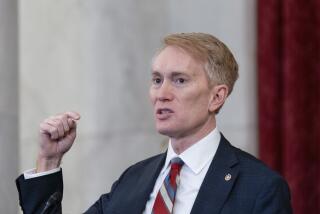‘Super committee’ deal seems unlikely, lawmakers say
The co-chairs of the congressional “super committee” seemed doubtful the panel would reach a deficit-reduction accord by Monday’s deadline, each blaming the other party’s unwillingness to budge on the contentious issues of taxes and entitlement spending.
In separate appearances on Sunday talk shows, Rep. Jeb Hensarling (R-Texas) and Sen. Patty Murray (D-Wash.) said they both held out hope for last-minute progress, but saw little chance of the impasse being broken.
“Nobody wants to give up hope. Reality is to some extent starting to overtake hope,” Hensarling said on “Fox News Sunday.” “Unfortunately, what we haven’t seen in these talks from the other side is any Democrat willing to put a proposal on the table that actually solves the problem.”
“There is one sticking divide, and that is the issue of what I call shared sacrifice, where everybody contributes in a very challenging time for our country,” Murray said on CNN’s “State of the Union.” “That line in the sand, we haven’t seen any Republicans willing to cross yet.”
Wednesday is the deadline for the 12-member panel to vote on a deficit-reduction package of at least $1.5 trillion. But any plan must be made public 48 hours earlier and be evaluated by the nonpartisan Congressional Budget Office, giving lawmakers little more than a day for a breakthrough.
After 14 weeks of talks, members say that conversations have been ongoing through the weekend.
“As long as we have members who have an opportunity to continue to talk, we’ll continue to talk,” Hensarling said. “I remain hopeful that someone on the other side will say this is too important to fail,” Murray said.
But publicly, there has been little progress since both sides balked at each other’s most recent proposals.
The Republicans’ latest offer was a package that would cut $640 billion off deficits over the decade, far below the committee’s goal but a fallback proposal that could at least make a down payment on reining in federal deficits and limit mandatory reductions.
The package included $542 billion in spending cuts and fees and $98 billion in savings from lower interest payments on the nation’s debt, along with $3 billion in new tax revenue that would come from closing the loophole that allows a tax deduction for corporate jets.
“Our Democratic friends said no to that offer because it didn’t raise taxes,” Sen. Jon Kyl (R-Ariz.) said on NBC’s “Meet The Press.” “When our Democratic friends are unable to cut even a dollar in spending without saying it has to be accompanied by tax increases, I think that tells you all you need to know about our runaway spending.”
Democrats initially sought $1 trillion in new taxes as part of a broader $3-trillion deal, a level of revenue Republicans call a nonstarter. Sen. John F. Kerry (D-Mass.), also on “Meet The Press,” said the notion that his party won’t agree to cuts without new taxes is “nonsense.”
“We just cut $917 billion without one dime of new revenue,” he said, referring to the summer debt-ceiling deal.
“We Democrats put a $4-trillion deal on the table, and it included huge, tough, horrible reductions on the sacred cows and things that we have been accused of not willing to do. But they wouldn’t accept it,” he said.
If no deal is reached, the debt-ceiling accord calls for automatic spending cuts to domestic and defense spending. Whether those would be realized is unclear; Sen. Pat Toomey (R-Pa.) said on CBS’ “Face The Nation” that it was important to “change the configuration” of the planned cuts to soften the blow on the Pentagon, in particular. Rep. Xavier Becerra (D-Los Angeles) said on Fox that it would be “wimpy” to undo the so-called triggers.
Both parties see the thorniest questions of whether to extend the Bush-era tax breaks and how to overhaul entitlement programs seems to be litigated in the 2012 elections. But even if the super committee fails this week, members say their work would continue.
“I believe strongly that we still have the capability to come together to solve this problem. If the super committee can’t do it, then I hope that Congress will,” Murray said.
michael.memoli@latimes.com
Lisa Mascaro in the Washington bureau contributed to this report.
More to Read
Start your day right
Sign up for Essential California for news, features and recommendations from the L.A. Times and beyond in your inbox six days a week.
You may occasionally receive promotional content from the Los Angeles Times.







